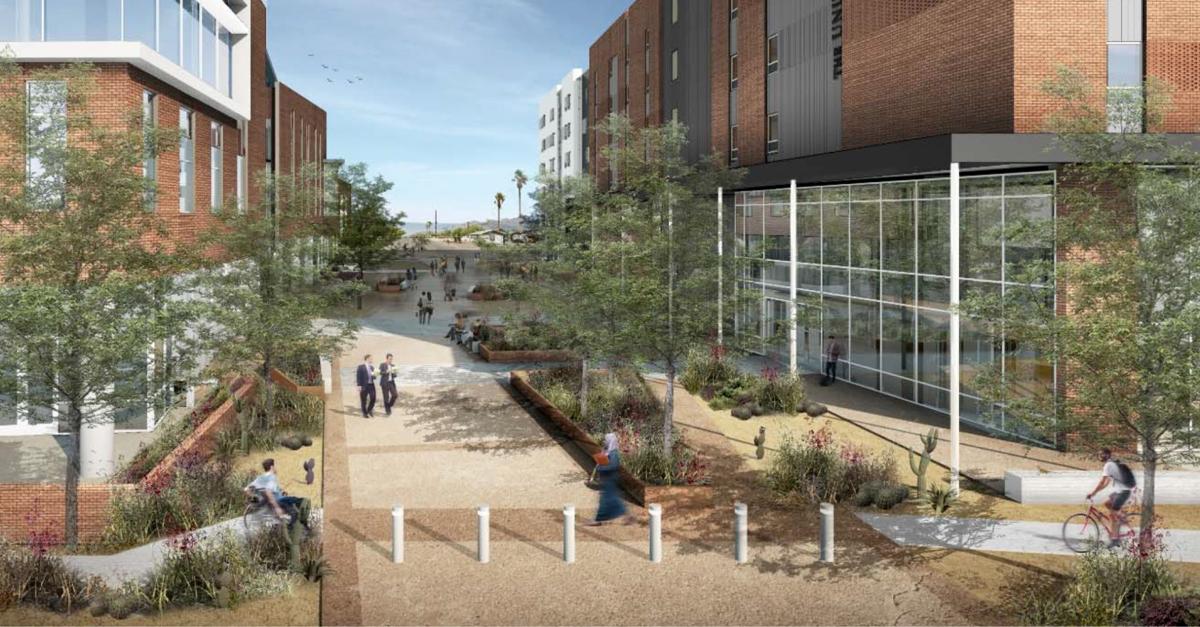FLAGSTAFF — The Arizona Board of Regents on Thursday unanimously approved for the University of Arizona to begin constructing a $137 million Honors College complex, described by the school as a “campus within a campus.”
Regents also approved the 2019-2021 Capital Improvement Plan that includes $66 million in upgrades to UA athletic facilities, including Arizona Stadium, requested by Athletic Director Dave Heeke.
This is the first phase in its development, and the projects will come back to the Regents in November for a second round of approval, which includes design and budgeting.
Construction of the massive honors complex just north of the current school boundaries is scheduled to begin in December and should be completed by August 2019. The 1,056-bed residence hall will house first-year Honors College students.
The idea for the project is to have one defined area for honors students to sleep, attend classes, eat and recreate. The school said in its presentation to the Regents the facility is needed to recruit the “best and brightest” students.
The complex will be built on UA-owned land from East Mabel and East Adams streets and between North Park and Santa Rita avenues.
A portion of North Fremont Avenue is being vacated by the city and will be turned into a pedestrian and bicycle mall area.
Gregg Goldman, senior vice president for business affairs and CFO of the UA, touted the project as a “comprehensive college to attract and retain the best students.”
The UA will enter a lease agreement with American Campus Communities, a private developer that will build the new student housing, dining, recreation, health, parking and academic facilities.
“The Honors College community will create the first full-service, living-learning community on UA campus,” according to ABOR’s executive summary.
Goldman said, “This will be an honors facility, but it will also be a facility that is for the community.”
There is currently not enough dorm space for first-time, full-time honors freshmen, in addition to all of the upperclassmen, graduate and international students who also require housing, according to the ABOR executive summary for the project.
ACC will finance, construct and operate the new dorms under the ground lease with the university. The construction cost of the residence hall is estimated at $84 million.
In a separate agreement, the UA will finance and ACC will build the other facilities, including the dining facility at $9.3 million, the academic spaces at $6.8 million, the recreation/health center at $26 million, and the parking garage and surface parking spaces at $2.5 million.
The UA will fund that construction using system revenue bonds and parking reserve funds (for the parking projects).
The annual debt service the UA will pay on the bonds for the construction will be $2.7 million, the school said in documents provided to the regents.
ABOR also approved the acquisition of a block of Fremont Street from the city of Tucson. The street will be between the honors dorm and the health and recreation facilities and will be converted to a pedestrian-only space.
“Working with our community,” Goldman said, “they actually support the closing (of the street) to create more pedestrian walkway and environment.”
Regent Rick Myers, a Tucson resident, praised the UA for working with the city on this project.
“I know you’ve worked hard with the city of Tucson, the neighborhood groups and (UA President) Robert Robbins personally,” he said.
“This wasn’t necessarily easy, but I think a good outcome has happened and I think relationships were strengthened. I appreciate the way you handled this.”
The city of Tucson has expressed concerns about the project, mainly if city zoning regulations would be adhered to in the project. The UA agreed to some conditions for the project, such as building height, traffic, parking and other issues, and not having balconies or a rooftop pool at the dorm.
Athletic upgrades
The Regents also approved plans for a series of construction projects to expand and upgrade UA athletic facilities as part of the UA’s Capital Improvement Plan.
Improvements include:
- $25 million to renovate Arizona Stadium in two phases, starting with the east-side ground level and student section, followed by renovations to the club areas and additional concessions and restroom upgrades. Construction on the first phase is to begin in January, with the second phase starting in January 2019.
- $18 million to build an indoor practice facility, with a 90-yard field, that will also function as a community engagement center. Construction is expected to start in May 2018. The facility is expected to be located in the corridor between East Sixth Street and East Enke Drive.
- $15 million to rebuild the 50-meter pool and replace plumbing at Hillenbrand Aquatic Center.
- And $8 million to completely renovate Hillenbrand Softball Stadium.
The combined cost of the four projects is $66 million, which will be funded through a combination of private donations and the new student athletics fee.
The UA still needs specific plans for these projects approved by the Regents, which is expected to happen in November, according to Heeke.





